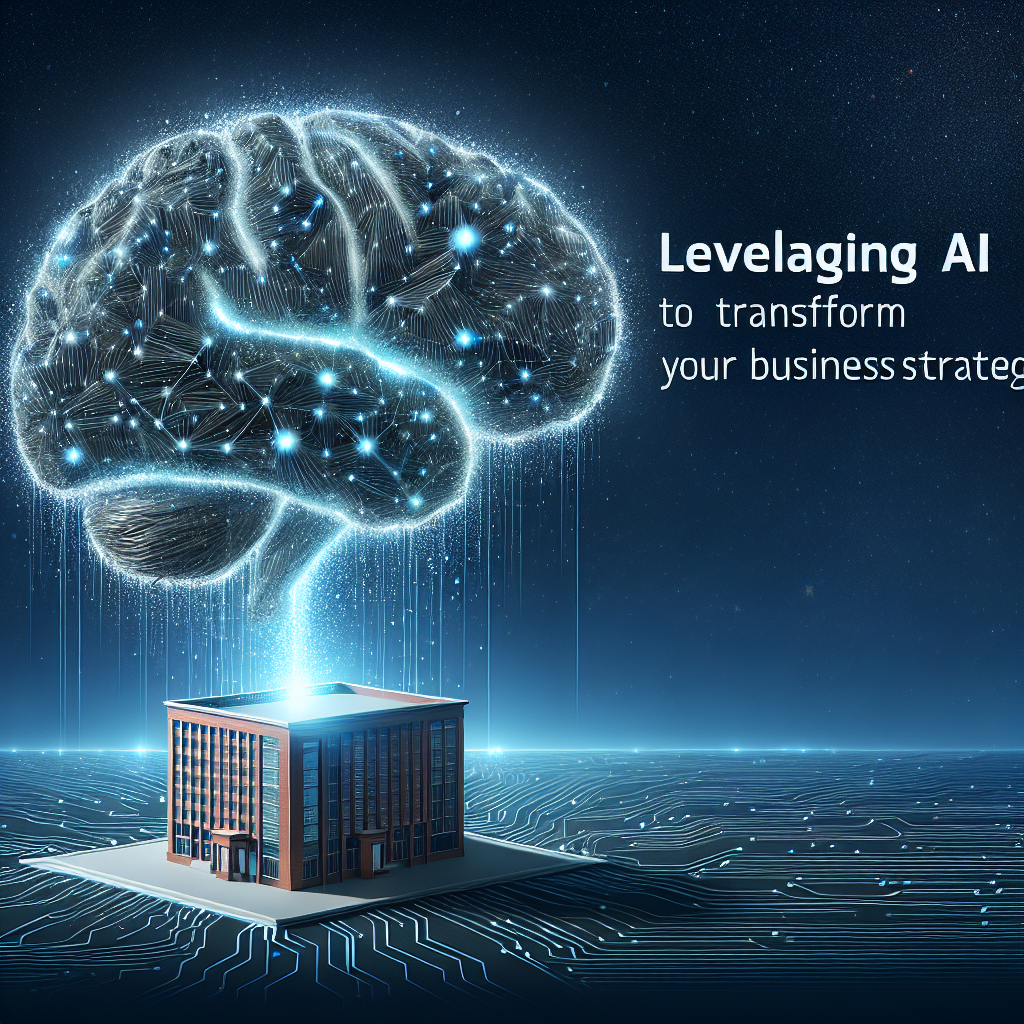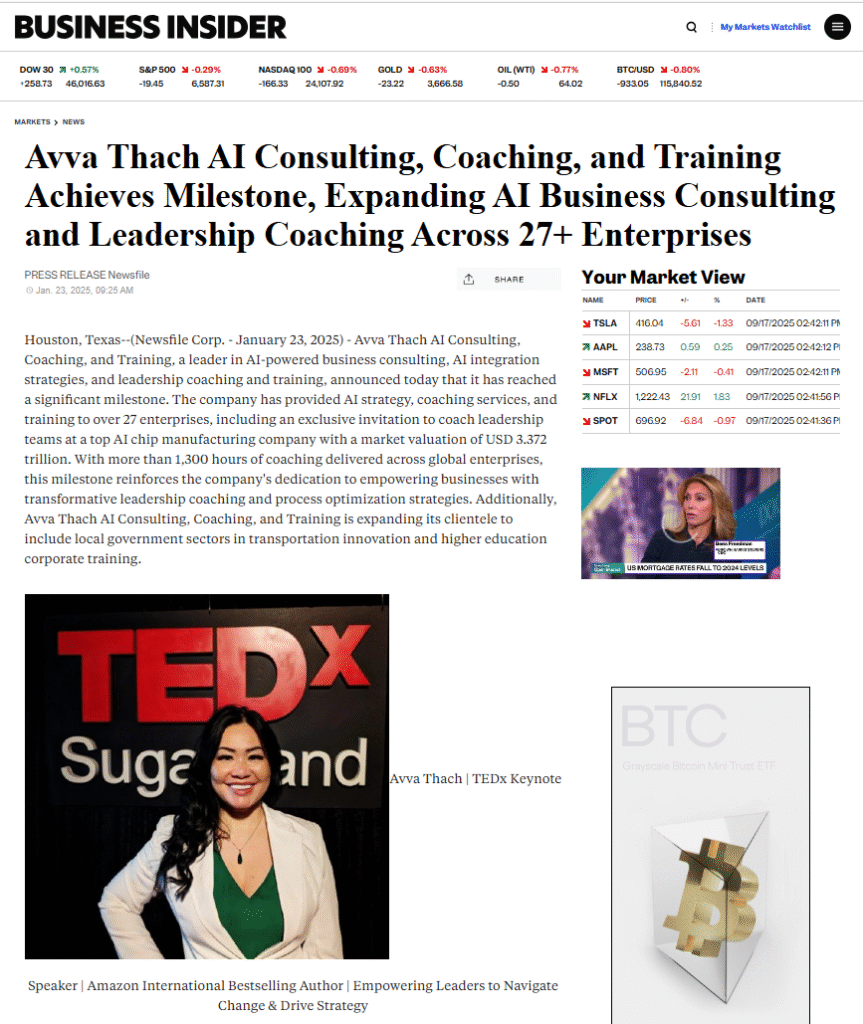Introduction
In this digital age, integrating AI-driven business solutions into your strategic planning is no longer optional; it’s essential. Think of AI as your trusty sidekick, like Robin to Batman, helping you save the day with data-driven decision-making and predictive analytics.
This blog will explore how leveraging AI can transform your business strategy, enhance operational efficiency, and ultimately provide a competitive edge. Whether you’re looking to optimize processes or innovate through machine learning, we’ve got you covered!
Did You Know?
According to recent studies, 93% of companies are currently undergoing some form of digital transformation. This makes understanding how to implement AI in strategic planning more crucial than ever!

So buckle up! We’re about to explore the role of AI in modern business strategies and how you can harness its power to drive measurable growth.
The Role of AI in Modern Business Strategies
In the dynamic landscape of today’s business world, AI has emerged as a crucial player in shaping the future of organizations through its application in business strategy. Think of it as the secret sauce that can turn your average business plan into a Michelin-starred masterpiece. But how exactly does artificial intelligence fit into this culinary concoction?
First off, let’s dive into the nitty-gritty. The role of artificial intelligence in business strategy is multifaceted, encompassing everything from predictive analytics to automation. It’s not just about having fancy algorithms; it’s about leveraging AI-driven business solutions to enhance operational efficiency and drive growth.
Key Insights:
- Predictive Analytics: AI enables businesses to forecast trends and customer behaviors with astonishing accuracy.
- Operational Efficiency: Automating routine tasks allows teams to focus on strategic innovation rather than mundane processes.
- Data-Driven Decision Making: Integrating AI tools helps organizations make informed decisions based on real-time data analysis.
The Shift Towards AI Integration
The shift towards integrating AI into strategic planning is not just a trend; it’s a necessity for survival in an increasingly competitive marketplace. Businesses that embrace this technology are not only optimizing their processes but also gaining a significant competitive advantage. Imagine being able to analyze market conditions faster than your competitors. That’s the power of using AI for market analysis!
A Common Misconception
A common misconception is that implementing AI solutions requires massive investments and complex infrastructures. In reality, many businesses start small and scale their efforts over time. By focusing on specific areas such as customer service automation or supply chain optimization, companies can gradually integrate innovative technologies into their operations.
The Future is Now
The future of business strategy with artificial intelligence looks bright, with continuous advancements paving the way for even more innovative applications. From enhancing decision-making processes to transforming entire business models, the potential is limitless. As we move forward, aligning AI with corporate objectives will be essential for maximizing ROI and ensuring sustainable growth.
Understanding AI for Business Strategy
When we discuss AI for business strategy, we’re entering a realm where technology intersects with
strategic thinking. Imagine having a trusted advisor who can sift through mountains of data faster than you can say “machine learning.” That’s what artificial intelligence brings to the table.
Definition and Importance
At its core, AI in business strategy refers to the integration of advanced technologies like machine learning and predictive analytics into the decision-making processes that shape a company’s direction. This isn’t just a trend; it’s a necessity for companies aiming to stay competitive in today’s fast-paced market.
Did you know that 93% of companies are currently undergoing digital transformation? That’s according to the International Data Corporation. If your business isn’t leveraging AI, it might be left behind!
Key Components of AI in Business Strategy
- Data-Driven Decision Making: With AI, businesses can analyze vast amounts of data quickly, enabling them to make informed decisions based on real-time insights.
- Predictive Analytics: This enables companies to forecast trends and behaviors, providing them with a strategic planning advantage.
- Operational Efficiency: AI tools can automate repetitive tasks, freeing up human resources for more creative work while optimizing processes.
- Market Analysis: Utilizing AI for market analysis enables businesses to understand customer needs better and tailor their offerings accordingly.
- Competitive Advantage: Companies that use AI strategically often find themselves ahead of competitors who rely on traditional methods.
The role of AI in enhancing business strategies is like adding rocket fuel to an already powerful engine. By integrating innovative technologies into strategic planning, organizations not only improve efficiency but also drive innovation. Think about it: when was the last time you made a decision based solely on gut feeling? In today’s data-driven world, relying on intuition alone is akin to navigating without a map.

If you’re looking to transform your business model or enhance operational efficiency, leveraging AI tools is essential. The future of business strategy is not just about keeping up but about leading the charge with innovative solutions that redefine what success looks like.
The bottom line? Integrating AI into your corporate strategy isn’t just smart; it’s vital for survival in this digital age. So roll up your sleeves and start exploring how you can harness the power of artificial intelligence for sustainable growth!
AI-Driven Business Solutions: A Game Changer
In the fast-paced world of business, AI for business strategy has emerged as a secret weapon that can propel companies ahead of the competition. Imagine you’re a chef in a bustling kitchen; without the right tools, your culinary masterpieces might end up as burnt toast. Enter AI-driven business solutions, your sous-chef that helps streamline operations, optimize processes, and enhance decision-making.
Overview of AI Tools for Business Strategy
From predictive analytics to machine learning algorithms, the arsenal of AI tools for business strategy is vast. These tools can analyze mountains of data faster than you can say “data-driven decision making.” Here’s a quick rundown:
- Predictive Analytics: Forecast future trends and customer behaviors.
- Natural Language Processing (NLP): Understand and analyze customer feedback in real-time.
- Automation Tools: Streamline repetitive tasks to boost operational efficiency.
- Data Visualization Software: Transform complex data into intuitive visuals for better insights.
Case Studies on Successful Implementation
If you’re still skeptical about the potential of integrating AI into your corporate strategy, consider these success stories:
- A Retail Giant: A leading retail company implemented AI-driven inventory management systems that reduced excess stock by 30% while improving customer satisfaction scores by 20% through optimized stock levels.
- A Financial Institution: A major bank utilized machine learning algorithms to detect fraudulent transactions in real-time, reducing fraud losses by over 50% within the first year.
- A Manufacturing Firm: By leveraging AI for predictive maintenance, this firm decreased equipment downtime by 40%, saving millions in operational costs.
The takeaway? Companies leveraging AI for strategic advantage are not just surviving; they are thriving. The future of business strategy with artificial intelligence is not just a trend it’s an essential evolution.
Integrating AI into Strategic Planning
So, you’ve decided to embrace AI for business strategy. Congratulations! You’re on the path to transforming your business. However, before you dive headfirst into the world of artificial intelligence in business strategy, let’s discuss how to integrate it smoothly into your existing strategic planning. Think of it as adding a secret ingredient to your favorite recipe; if done right, it elevates the dish from ordinary to extraordinary!
Steps to Incorporate AI into Existing Strategies
- Assess Current Processes: Take a good look at your current strategies and identify areas where AI can add value. Are there repetitive tasks that could be automated? Is there data that could be analyzed for deeper insights?
- Define Clear Objectives: What do you want to achieve with AI? Whether it’s enhancing operational efficiency or utilizing predictive analytics in business strategy, having clear goals will guide your integration efforts.
- Select Appropriate AI Tools: Not all AI tools are created equal! Research and choose those that align best with your objectives, be it machine learning in business strategy or specific AI-driven business solutions.
- Pilot Programs: Implement small-scale pilot programs to test the waters. This allows you to evaluate effectiveness without committing fully from the start.
- Gather Feedback and Iterate: After implementing pilots, gather feedback from stakeholders and team members to inform future iterations. Use this input to refine your approach before implementing it on a full scale.
Aligning AI with Corporate Objectives
The magic happens when you align AI initiatives with your corporate objectives. This means ensuring that every AI implementation is not just a shiny new toy, but serves a purpose, such as enhancing decision-making with AI technologies or optimizing business processes with AI.
Key Takeaway: Integrating AI into strategic planning isn’t just about technology; it’s about transforming how decisions are made and aligning them with broader corporate goals. Think of it as upgrading your navigation system. While driving towards your destination, you’ll reach your goals faster and more efficiently!
Remember, the role of AI in modern business strategies isn’t just about automation; it’s about driving strategic innovation with AI. By carefully integrating these technologies, you can achieve a competitive advantage that keeps you ahead of the curve!

Data-Driven Decision Making with AI Technologies
In the world of AI for business strategy, data is the new oil. But instead of drilling for it, we’re harnessing it with advanced technologies to fuel our decision-making processes. Data-driven decision making with AI technologies is not just a trend; it’s a necessity for businesses aiming to stay competitive in today’s fast-paced market.
Imagine trying to navigate a maze blindfolded. That’s what making decisions without data feels like. AI, particularly through predictive analytics and machine learning, acts as our guide, illuminating the path ahead.
The Importance of Predictive Analytics in Business Strategy
Predictive analytics is like having a crystal ball that tells you what’s likely to happen next based on historical data. Companies leveraging this AI-driven business solution can:
- Identify trends: Spotting patterns in customer behavior can lead to better product offerings.
- Avoid pitfalls: Understanding potential risks allows businesses to pivot before issues arise.
- Enhance forecasting: Accurate predictions lead to more innovative inventory management and resource allocation.
Using AI for Market Analysis and Insights
When it comes to market analysis, traditional methods are often slow and cumbersome. Enter AI tools for business strategy that can analyze vast datasets at lightning speed. Here’s how:
- Real-time data processing: AI systems can analyze social media trends, sales data, and customer feedback in real-time, providing timely and relevant insights.
- Sentiment analysis: Understanding how customers feel about your brand or product can inform marketing strategies and product development.
- Competitive analysis: By analyzing competitors’ strategies using AI algorithms, businesses can identify market gaps and capitalize on growth opportunities.
Key Takeaway: Integrating AI into your strategic planning process not only enhances decision-making but also aligns your operations effectively with market demands. Businesses that embrace data-driven decision-making are more likely to achieve operational efficiency and maximize ROI.
Enhancing Operational Efficiency through Automation and AI
In the ever-evolving landscape of business, operational efficiency is the golden ticket to staying ahead. Enter automation and AI a dynamic duo that promises to streamline processes, reduce costs, and invigorate productivity. Think of them as the Batman and Robin of modern business strategy. But how exactly do they work together to enhance operational efficiency?
AI for Operational Efficiency: Benefits and Challenges
Integrating AI for business strategy can yield significant benefits, including:
- Cost Reduction: Automating repetitive tasks enables businesses to reduce labor costs while reallocating human resources to more strategic roles.
- Increased Accuracy: AI minimizes human error, ensuring data integrity and consistency in operations.
- Faster Decision Making: With real-time data analysis, companies can make informed decisions swiftly because who has time to wait?
- Scalability: As your business grows, AI solutions can easily adapt without requiring a complete overhaul of existing systems.
However, like any superhero tale, there are challenges:
- Cultural Resistance: Employees may resist changes due to fear of job loss or unfamiliarity with new technologies.
- Implementation Costs: Initial investments in AI tools can be substantial; however, the long-term savings often outweigh these upfront costs.
- Lack of Expertise: Finding skilled professionals who understand both AI and your industry can be a daunting task.
Examples of Automation in Strategic Management
The application of automation within strategic management is not just theoretical; it’s happening right now across various industries. Here are some inspiring examples:
- Coca-Cola has leveraged AI-driven analytics for demand forecasting, enabling it to optimize its supply chain effectively.
- DHL: By implementing automated sorting systems in its warehouses, DHL has significantly reduced processing times and improved delivery efficiency.
- Zara: The fashion giant utilizes machine learning algorithms to analyze customer preferences and optimize inventory management, ensuring they have just what you want when you need it.
A study by McKinsey found that organizations that integrate automation into their operations see an average productivity increase of 20-30%. That’s not just a boost, it’s a game changer!

The takeaway? Embracing automation and AI is no longer merely an option; it’s essential for businesses seeking operational excellence. So why not start exploring how you can leverage these technologies today? After all, the future waits for no one!
Transforming Business Models with AI Technology Solutions
In the rapidly evolving landscape of business, AI for business strategy is not just a buzzword it’s the secret sauce that can turn your business model from “meh” to “magnificent.” Think of AI as your trusty sidekick, ready to help you tackle the complexities of modern markets while boosting efficiency and innovation.
Imagine a world where data is not just collected but transformed into actionable insights. With artificial intelligence in business strategy, companies can leverage vast amounts of data to make smarter decisions, optimize processes, and ultimately enhance their competitive advantage. Here’s how:
- Predictive Analytics: By utilizing AI-driven predictive analytics, businesses can forecast trends and customer behaviors with impressive accuracy. This means you’re not just reacting to market changes but anticipating them.
- Operational Efficiency: Integrating AI tools for business strategy helps streamline operations. Automation can take over repetitive tasks, allowing your team to focus on strategic innovation rather than getting bogged down in the nitty-gritty.
- Market Analysis: Using AI for market analysis provides deep insights into consumer preferences and emerging trends. This enables businesses to pivot quickly and align their offerings with what customers truly want.
A prime example of this transformation is seen in retail giants like Amazon. By leveraging machine learning in business strategy, they personalize shopping experiences, optimize inventory management, and even predict what you’ll want before you know it yourself! Talk about being ahead of the curve!
Key Takeaway: The role of AI in modern business strategies is pivotal. Companies that embrace these technologies not only enhance decision-making but also create a culture of innovation that drives growth.
However, let’s not forget the common pitfalls. Many organizations rush into implementing AI without a clear strategy or understanding of their objectives. This often leads to wasted resources and missed opportunities. To avoid this:
- Define Clear Goals: Align your AI initiatives with corporate objectives from the start.
- Cultivate a Data-Driven Culture: Encourage teams to adopt data-driven decision-making by providing training and support.
- Pilot Programs: Begin with small-scale pilot projects before scaling up your AI solutions organization-wide.
The future of business models lies in effectively integrating these innovative technologies into strategic planning and execution. As we continue down this path of digital transformation and AI strategy, remember: it’s not just about technology; it’s about enhancing human capabilities and fostering an environment where creativity thrives alongside automation.
The bottom line? Leveraging AI for business growth is no longer merely an option; it’s essential for survival in today’s competitive landscape. So gear up! The future is bright for those who dare to innovate!
The Future of Business Strategy with Artificial Intelligence
As we peer into the crystal ball of business strategy, one thing is clear: artificial intelligence is not just a trend; it’s a revolution. The integration of AI into business strategy is reshaping how companies operate, innovate, and compete. But what does this mean for the future?
First off, let’s talk about AI-driven business solutions. These aren’t just fancy algorithms; they are the backbone of strategic innovation. Companies leveraging AI for business growth are not just keeping up they’re setting the pace. For instance, organizations that use predictive analytics in their business strategy can foresee market shifts and consumer behavior with uncanny accuracy. This foresight allows businesses to pivot quickly and efficiently, maximizing ROI and minimizing wasted resources.
Imagine a world where your strategic planning meetings are powered by AI tools that provide real-time data analysis and insights. With AI for market analysis, businesses can identify trends before they become mainstream, giving them a competitive advantage that is hard to beat. This isn’t science fiction; it’s happening now!
Key Takeaway: Integrating AI into business strategies enhances decision-making capabilities and operational efficiency, ultimately transforming traditional business models.
The Shift Towards Automation in Strategic Management
The future also points towards increased automation in strategic management processes. By automating routine tasks, businesses can free up valuable human resources to focus on creative problem-solving and strategic initiatives. This shift not only improves efficiency but also fosters a culture of innovation.
A Data-Driven Approach to Decision Making
Data-driven decision-making with AI technologies will become the norm rather than the exception. Companies that harness machine learning in their strategies will be able to analyze vast amounts of data at lightning speed, uncovering insights that were previously hidden in plain sight.
Navigating Challenges with Smart Technologies
However, it’s not all smooth sailing. Businesses must navigate challenges such as data privacy concerns and the need for skilled personnel who understand how to effectively implement these advanced technologies. The role of AI in modern business strategies includes addressing these challenges head-on.
The Importance of Aligning AI with Corporate Objectives
A crucial aspect of successfully implementing AI solutions for strategic advantage is ensuring that these technologies align with corporate objectives. Businesses should ask themselves: How can we use AI to enhance our existing strategies? What specific problems do we want to solve?
According to a report by McKinsey, companies that integrate AI into their corporate strategy see an increase in productivity by 20-30%.
The future of business strategy with artificial intelligence isn’t just about adopting new tools; it’s about transforming mindsets and processes across the organization. By embracing this change now, companies position themselves as leaders in their respective industries.
In conclusion, the adoption of artificial intelligence in business strategy is more than just an enhancement; it’s a necessity for survival in an increasingly competitive landscape. Are you ready to leverage AI for your company’s growth?
Conclusion
In the ever-evolving business landscape, leveraging AI for business strategy is no longer just an option; it’s a necessity. The integration of artificial intelligence into business strategy presents a wealth of opportunities for companies seeking to innovate and expand. From enhancing decision-making processes to optimizing operational efficiency, the benefits are as vast as they are profound.
As we’ve explored, the role of AI in strategic planning isn’t merely about adopting new technologies; it’s about reshaping how we think about and approach challenges. By embracing AI-driven business solutions, organizations can gain a competitive advantage that not only meets current market demands but also anticipates future trends.
Key Takeaway: To truly harness the power of AI, businesses must align their AI initiatives with corporate objectives, ensuring that every data-driven insight fuels strategic innovation and growth.
However, adopting AI tools for business strategy isn’t without its challenges. Companies must be prepared to navigate cultural shifts and skill gaps within their teams. The successful implementation of AI solutions requires a commitment to continuous learning and adaptation. As we look to the future, organizations that prioritize integrating AI into their strategies will undoubtedly be those that lead their industries.
The future of business strategy with artificial intelligence is bright and full of possibilities. By focusing on data-driven decision-making with AI technologies, companies can not only enhance operational efficiency but also transform their entire business models. Remember, it’s not just about technology; it’s about how you use it to create value.
If you’re ready to take your business strategy to the next level with AI, now is the time to act. Begin by evaluating your current plan and pinpointing areas where AI can have a significant impact. The journey may seem daunting, but with the right approach and guidance, your organization can thrive in this digital age.
The Role of AI in Modern Business Strategies
Understanding AI for Business Strategy
- Definition and Importance
- Key Components of AI in Business Strategy
AI-Driven Business Solutions: A Game Changer
- Overview of AI Tools for Business Strategy
- Case Studies on Successful Implementation
Integrating AI into Strategic Planning
- Steps to Incorporate AI into Existing Strategies
- Aligning AI with Corporate Objectives
Data-Driven Decision Making with AI Technologies
- The Importance of Predictive Analytics in Business Strategy
- Using AI for Market Analysis and Insights
Enhancing Operational Efficiency through Automation and AI
- AI for Operational Efficiency: Benefits and Challenges
- Examples of Automation in Strategic Management





















Leave a Reply